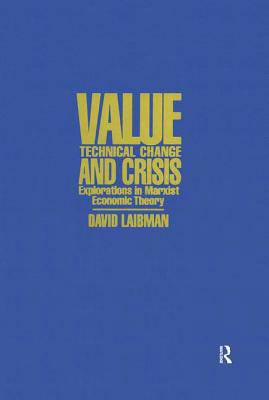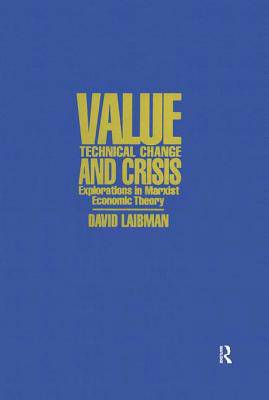
Bedankt voor het vertrouwen het afgelopen jaar! Om jou te bedanken bieden we GRATIS verzending (in België) aan op alles gedurende de hele maand januari.
- Afhalen na 1 uur in een winkel met voorraad
- In januari gratis thuislevering in België
- Ruim aanbod met 7 miljoen producten
Bedankt voor het vertrouwen het afgelopen jaar! Om jou te bedanken bieden we GRATIS verzending (in België) aan op alles gedurende de hele maand januari.
- Afhalen na 1 uur in een winkel met voorraad
- In januari gratis thuislevering in België
- Ruim aanbod met 7 miljoen producten
Zoeken
Value, Technical Change and Crisis
Explorations in Marxist Economic Theory
David Laibman
Hardcover | Engels
€ 366,45
+ 732 punten
Uitvoering
Omschrijving
This text brings together studies in various aspects of the theory of the capitalist economy. It focuses on major themes of the Marxist tradition that postulate the existence and importance of social relations and structures underlying the esoteric realm of economic categories: prices, profits, wages, etc. The author takes a reappraising, critical look at the concepts of the deep structure - value, explitation, immanent crisis - using the analytical tools of modern economics to improve those concepts. The book is divided into four parts. Part 1 explores the essential nature of capitalism, re-examining problems in the theory of value and exploitation. Part 2 tackles the issue of capitalism-specific paths of growth and technical change, putting forward a rigorous theory of biased technical change and non-steady-state growth. Part 3 examines the cyclical character of capitalist growth and the theory of crises. Finally, Part 4 places capitalism in the wider framework of modes of production, considering the theory of precapitalist formations and aspects of the theory and practical experience of socialism. The guiding theme is the combination, or confrontation, of rigorous, quantitative analytical techniques with equally demanding qualitative and political-economic conceptualization. The book's premise is that this interface is essential to a progressive yet distinctively Marxist social theory.
Specificaties
Betrokkenen
- Auteur(s):
- Uitgeverij:
Inhoud
- Aantal bladzijden:
- 392
- Taal:
- Engels
Eigenschappen
- Productcode (EAN):
- 9780873327350
- Verschijningsdatum:
- 30/06/1992
- Uitvoering:
- Hardcover
- Formaat:
- Genaaid
- Afmetingen:
- 152 mm x 229 mm
- Gewicht:
- 703 g

Alleen bij Standaard Boekhandel
+ 732 punten op je klantenkaart van Standaard Boekhandel
Beoordelingen
We publiceren alleen reviews die voldoen aan de voorwaarden voor reviews. Bekijk onze voorwaarden voor reviews.









